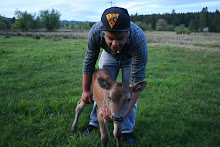 For months I have been teasing customers with the start of wild salmon season. In fact, one of the two signs near my counter features a full page layout of salmon-porn. I have been looking forward to offering an alternative to farmed salmon. Salmon has been one of the few hitches in our road toward being a totally sustainable fish counter. This road has been bumpy and has presented both Bryan and I with great opportunities to educate our customers as well as ourselves.
For months I have been teasing customers with the start of wild salmon season. In fact, one of the two signs near my counter features a full page layout of salmon-porn. I have been looking forward to offering an alternative to farmed salmon. Salmon has been one of the few hitches in our road toward being a totally sustainable fish counter. This road has been bumpy and has presented both Bryan and I with great opportunities to educate our customers as well as ourselves.Some decisions were easy to make, like never ordering Atlantic cod or non-organic farmed salmon. However, it has been very hard to pry people away from a few things, regardless of environmental and health concerns. Salmon has been one, shrimp is another. Big, carnivorous fish like salmon are difficult to farm responsibly because they require large amounts of fish meal/oil and constant running water. Among many other concerns with farmed salmon are the antibiotics, hormones and dyes used in the feed that end up returning to the rivers near the farms, polluting them and threatening native populations. Avoiding farmed salmon seems like a no-brainer, right? Not so easy.
People want salmon year-round, but salmon season typically only runs from late-Spring to mid-Fall. We do the best we can by buying only farmed organic salmon which scores higher on every sustainable fish guide than non-organic farmed salmon. While we only buy from companies with upstanding environmental reputations, wild salmon is a still far better choice for the environment. My hope had been to try to wean my customers off of farmed salmon, if only for the wild salmon season.
Today sad reality struck in the form of an email from my fish supplier...
Due to extremely low runs this year, both California and Oregon have completely canceled their King salmon seasons. That means all the U.S. wild King salmon we've been looking forward to has to come out of Washington, and later in the season, Alaska. Obviously, this means a much smaller amount of fish to go around. Low availability translates to higher prices, meaning I would have to sell it for about $32/lb--twice as much as the farmed organic salmon. Not exactly an enticing trade for customers. I am still crossing my fingers for the Sockeye and Coho runs, which are expected to be pretty normal this year. The few Steelhead that make it to the east coast are beautiful, too. If you see some, make sure to grab it!
In my recent post "Fish is Fish", I listed several sites to help you navigate the murky waters of choosing the right fish to eat. I encourage everyone to check with at least one list if you are not absolutely sure of both the environmental and health concerns regarding the specific species you are going to eat. The info is out there, but it is up to you to use it.
You may have also noticed that I specifically said "U.S. wild King salmon". We try to stick with only domestic fisheries, both for reducing our carbon footprint from flying seafood all over the world and because there is more oversight by U.S. environmental organizations and agencies. There is no international governing body dictating practices for the world's fisheries. Some countries encourage responsible techniques, some do not. Beyond that, it is hard to even find the regulations for some countries. As a fish buyer in Brooklyn it is much easier for me to find information on the practices of my striped bass farm in Massachusetts than it is to find out about the imported farmed shrimp that appears in my order from a different country each time. For this reason I have all but stopped selling imported shrimp. I do still keep a few bags on hand for those who just can't get down with paying $2 more for plump, juicy, never-frozen Shrimp from Florida. The same is true for wild species, I may be able to find out exactly where and how my Mahi-Mahi is caught, but Chilean sea bass is quite a risky bet. There's almost no way to be sure it wasn't poached.
I say I don't mean to preach, but I do. When it comes to fish, every single decision really counts. You're either aiding environmental destruction or stopping it, plain and simple.



No comments:
Post a Comment